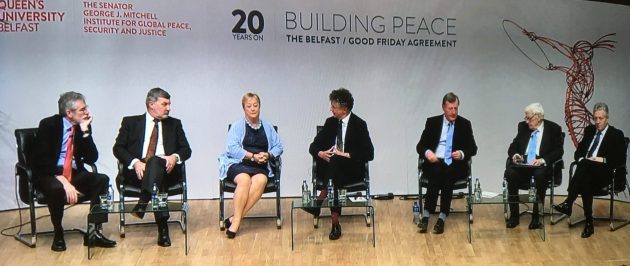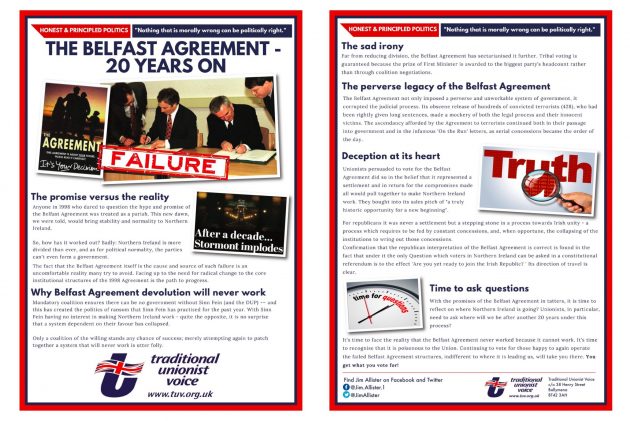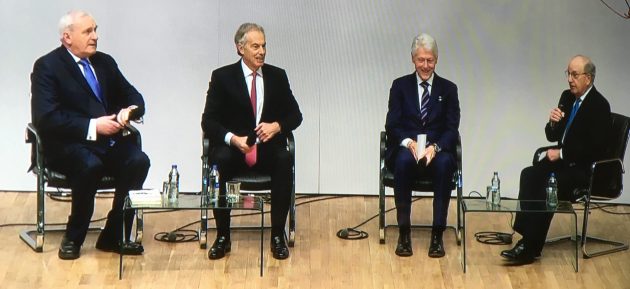Political leaders of old and today gathered at Queen’s University, Belfast for a day of events focussed on the 20th anniversary of the Good Friday Agreement.
In the morning Conor Murphy, Liz O’Donnell, Lord Empey, Mark Durkan and David Andrews gathered to talk with Tim O’Connor to unpick some of the machinations behind the design of the Agreement.
After lunch, the focus moved to those who had been leading the negotiations in the years up to 1998 and those who are guaranteeing the Agreement today.
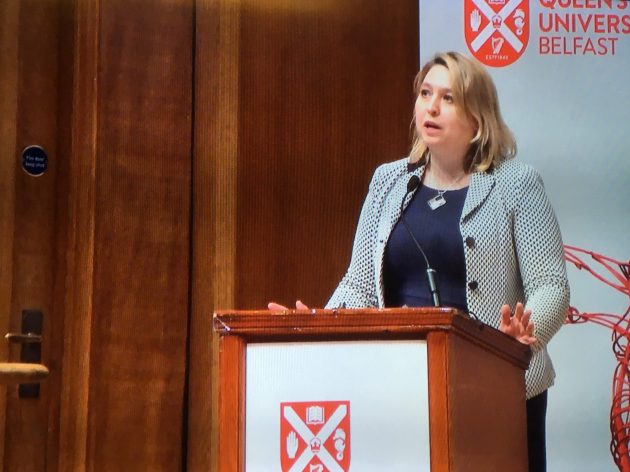 Secretary of State Karen Bradley MP described the Agreement as a moment when “politics triumphed over division and politics”.
Secretary of State Karen Bradley MP described the Agreement as a moment when “politics triumphed over division and politics”.
An Tánaiste Simon Coveney TD said that “a new faith in politics … and in each other took root” when the Agreement was signed on Good Friday in April 1998. He spoke around the themes of needing “to remember, to renew and to reconcile”.
“We need to keep in mind what it was like before the Good Friday Belfast Agreement and the remember why we felt such joy and optimism 20 years ago … The evidence of the conflict is social, physical and psychological …”
On the need to reconcile, he finished his speech saying: “We have a further chance and we should take it.”
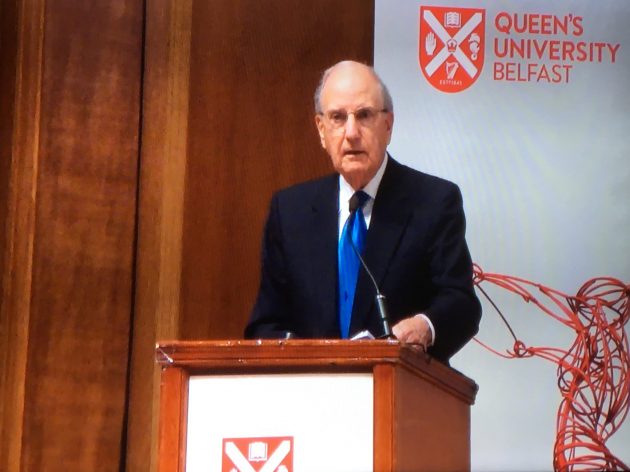 Senator George Mitchell (Chancellor Emeritus of Queen’s University) spoke about his involvement in the five years of talks and his fondness for Northern Ireland. He went on to praise the role of politicians.
Senator George Mitchell (Chancellor Emeritus of Queen’s University) spoke about his involvement in the five years of talks and his fondness for Northern Ireland. He went on to praise the role of politicians.
“It’s fashionable across the western world to demean political leaders … but we should applaud those who dare greatly and succeed, but in Northern Ireland these were ordinary men and women … and after 700 days of failure they joined in one day of success and changed the course of history”
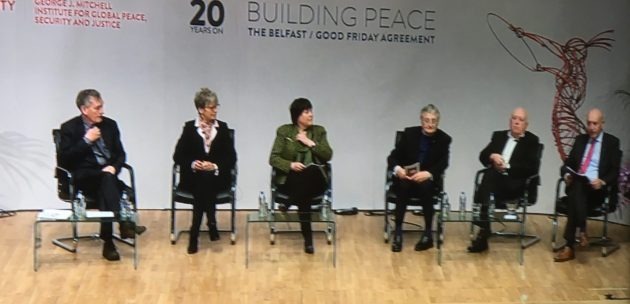 The first of three panels discussed the current security situation. Denis Bradley said “the dissidents are like teddy boys at a rave party” but questioned the reliability of yesterday’s loyalist paramilitary statement “[to] support the rule of law in all areas of life and emphatically condemn all forms of criminal activity” given that guns remain in the background.
The first of three panels discussed the current security situation. Denis Bradley said “the dissidents are like teddy boys at a rave party” but questioned the reliability of yesterday’s loyalist paramilitary statement “[to] support the rule of law in all areas of life and emphatically condemn all forms of criminal activity” given that guns remain in the background.
Rev Harold Good reminded the audience that IRA decommissioning had been questioned at the time but few doubted what had happened now. He said that issues of economic and employment disadvantage together with educational underachievement go together with a culture of lawlessness. Those are what need to be addressed to transform communities.
Bronagh Hinds received strong applause in the Whitla Hall when she said that “women are not just victims but agents for change”. While “twenty years is a long time to wait for someone to come out with a statement about peace … we welcome it.” But she added that we need to invest in communities.
The second panel brought together Gerry Adams, Lord Alderdice, Seamus Mallon, Monica McWilliams, Peter Robinson and Lord Trimble.
Seamus Mallon spoke at length:
“Sunningdale was a much better agreement for nationalists than the Good Friday Agreement, but one section of nationalism blew it out … The lesson of that was that somehow or another in the Good Friday Agreement we got a rapprochement between the unionism of David Trimble and Peter [Robinson] and nationalism.”
The former ‘first’ deputy First Minister added:
“The overriding political philosophical question that was hovering around the Good Friday Agreement was parity of esteem and justice. I believe there’s an issue now that has to be faced. No more ambiguity however constructive. Let’s look if straight in the eye and ask: what can we nationalist community – do to allow unionism to breath without the threat of constitutional change that they don’t agree with … I come from the hills of South Armagh … I want to be able to persuade unionists that Irish unity would be a good thing for us and them. I can’t do that if they are afraid and can’t breathe, if this threat is always there … that they don’t belong here.”
Gerry Adams said that the 1998 Agreement “was a better deal than Sunningdale”. Later in his remarks he commented on the contemporary political talks that have broken down.
“We had a draft agreement with the DUP leadership a month ago. The DUP leader [Arlene Foster] is hear: I think she acted in good faith. For whatever reason the DUP couldn’t agree that draft agreement – it wasn’t a done deal but … – but I was satisfied that it was the best that could be done at that time. We haven’t got that deal. But it’s not going away you know. All of these issues remain about unresolved rights. When we get that out of the way we can then get on with being friends with each other.”
Chair Jonathan Powell asked Lord Trimble why his prediction of ideological politics breaking out in Northern Ireland hadn’t happened. “Part of the reason is that the party you were associated with [Labour] didn’t bring in the Labour party and Lib Dems to Northern Ireland’”
Peter Robinson thanked the organisers for his invitation to participate, recognising that he was an awkward fit on the platform. “It feels like I’ve just walked into act 3 scene 4 of Macbeth” but welcomed the opportunity to see “old faces” on the Whitla Hall stage.
“In some ways I’m encouraged about the kind of issues that we’re arguing about today … not about death and destruction on our streets [or] constitutional issues. I have absolutely no doubt that both Arlene and Michelle are capable of doing a deal. I have absolutely no doubt about that. And I go find further that I think that eventually they will do a deal.”
Seamus Mallow chipped in at the end of the panel to respond to Peter Robinson: “It’s not Macbeth you should be looking at. It’s the last act of Hamlet. Who is young Fortinbras?!” [Wikipedia explains: after Hamlet dies Hamlet dies ‘Fortinbras, seeing the entire Danish royal family dead, takes the crown for himself, and orders a military funeral to honour Hamlet’.]
In an echo of the original negotiations, outside the Whitla Hall TUV leader Jim Allister was handing out anti-Agreement leaflets.
Jim Allister handing out anti GFA leaflets outside the venue.
@QUBelfast event pic.twitter.com/sFD605d95a
— Claire J (@clairej1989) April 10, 2018
The final was chaired by Senator George Mitchell and brought a former president and two former prime ministers onto the Whitla Hall stage.
Tony Blair counselled:
“The important thing is not to compare where we are with where we want to be … the comparison is between where we are and where we used to be … to remember waking up every single day to news of terrorism … I know the tensions and difficulties are still there.
He added:
“This agreement is worth preserving and working and building upon … it may not be where we want to be but it’s a world better than where we were … This Good Friday Agreement for all its faults was something that is worth doing and is worth keeping.”
Bertie Ahern began by remarking:
“You could have got a better building than Castle Buildings! I did admire Lancaster House, Number 10, Leeds Castle, Weston [Park] … the food and the drink was much better!”
He described the negotiations as allowing the participants to “hold their aspirations but get honourable compromises”.
“Big issues were resolved not by the four of us [Ahern, Blair, Clinton, Mitchell] but by everybody. There are issues remaining but I don’t think they are bigger than what we resolved … I do hope that sooner rather than later – for the people who live on the island of Ireland and in particular Northern Ireland – you must see this through to the next phase and I wish you well doing that.”
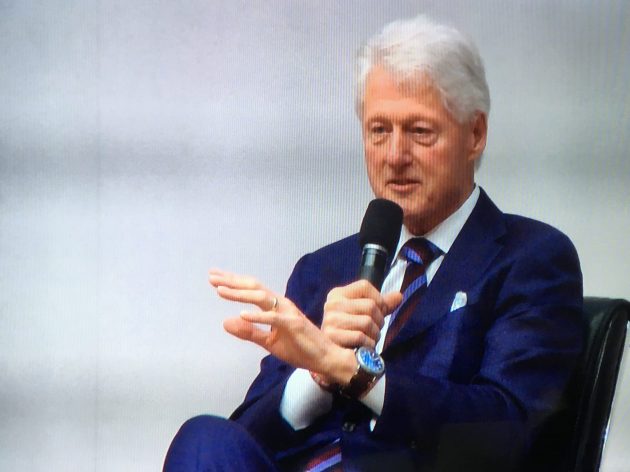 President Bill Clinton said that his intention in appointing George Mitchell was to “jump start the process”.
President Bill Clinton said that his intention in appointing George Mitchell was to “jump start the process”.
“There are only two things that the US can do to help [countries in conflict] –now you may need to come and help us {audience laughs) – we can maximise the rewards and minimise the risks of those brave enough to seek peace, and if we are trusted we can do our very best to listen.”
Later he said:
“It was hard for David Trimble but he hung in there. He got a Nobel prize but his party lost their leadership in the centre right, but that often happens. I’m proud of Seamus Mallon … [Then] we wound up with the famous odd couple of Mcguinness and Paisley – now that I could not have mediated or made it work!
“In the wake of all of this tribalism going on around the world today – identity politics psychological politics … – rearranging the deckchairs in society’s hierarchies … The Good Friday Agreement is a work of genius … it’s applicable if you care at all about preserving democracy … majority rule, minority rights … rule of law, end of violence, shared decision making, shared economic benefits … and then let the future take its course.”
He made three suggestions: (1) keep the cranes up in Belfast up at all costs; (2) have social solidarity; (3) have an information eco-structure where people accept the same facts so at least they’re arguing over the same basis.
“You have the option of paralysis now because we require consent … be proud of it.”
He finished by repeating his tryptic of advice:
“Keep the cranes up. Keep the voices free. Keep the votes fair. You’ll figure it out.”
Blair was interrupted by sustained applause when he said “I’m passionately opposed to Brexit”. Back to the Good Friday Agreement he said:
“The process taught me something about politics … At each stage there were people who were prepared to say difficult things to their own supporters. The biggest test in politics is not getting up to say ‘yes’ to your supporters but to say ‘no’ … It’s those compromises and the courage in making them that makes progress … Every single person involved in this process had personal stories and deep personal reasons why they shouldn’t compromise. They could have gone out to their supporters and say ‘they want me to compromise but I’m not going to’ … They were prepared not to forget the past, but not to let it decide the future.
“They should realise that this agreement was never going to support all the problems of Northern Ireland. That’s going to take two generations to do … [There are still big problems in Kosovo.] Even today they are still working at it but it’s better than it was.
“Just for once politics came into alignment with principle and practical common sense …”
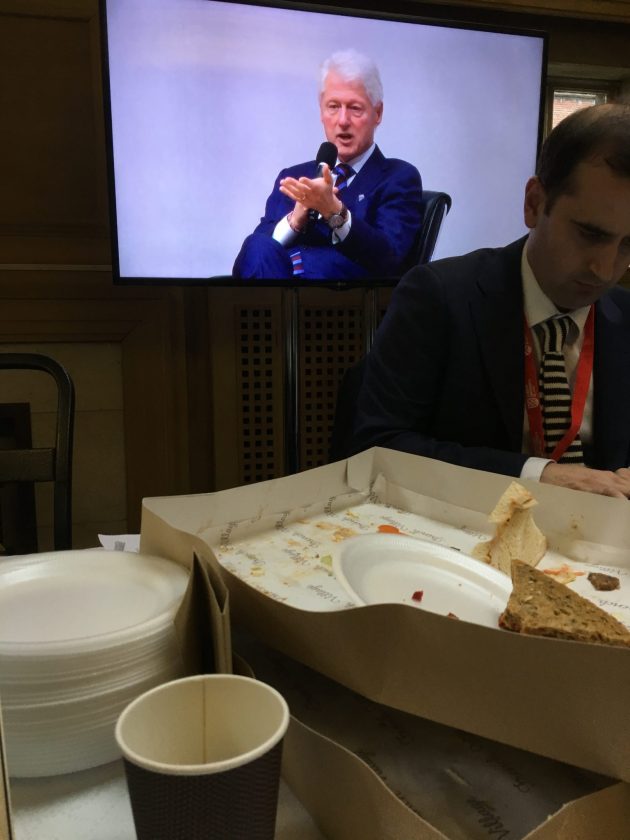 Clinton’s final comments remarked that old men with grey hair could sit on the stage and talk about the past but pointed down into the audience at the row in which Arlene Foster and Mary Lou McDonald were sitting and said that the future was in the hands of these “young” women.
Clinton’s final comments remarked that old men with grey hair could sit on the stage and talk about the past but pointed down into the audience at the row in which Arlene Foster and Mary Lou McDonald were sitting and said that the future was in the hands of these “young” women.
George Mitchell finished by paying tribute to General John de Chastelain and the former Finnish ex-Prime Minister Harry Holkerri who helped him with the negotiations.
While storm clouds gathered over Belfast this afternoon, there was a spirit of optimism, even among the local politicians, about the political and civic future of Northern Ireland.
Alan Meban. Tweets as @alaninbelfast. Blogs about cinema and theatre over at Alan in Belfast. A freelancer who writes about, reports from, live-tweets and live-streams civic, academic and political events and conferences. He delivers social media training/coaching; produces podcasts and radio programmes; is a FactCheckNI director; a member of Ofcom’s Advisory Committee for Northern Ireland; and a member of the Corrymeela Community.
Discover more from Slugger O'Toole
Subscribe to get the latest posts to your email.

